Antimicrobial resistance and its impact on cancer care
Antimicrobial resistance (AMR) or drug resistance, including antibiotic resistance, is a growing public health issue and needs urgent attention in countries around the world.
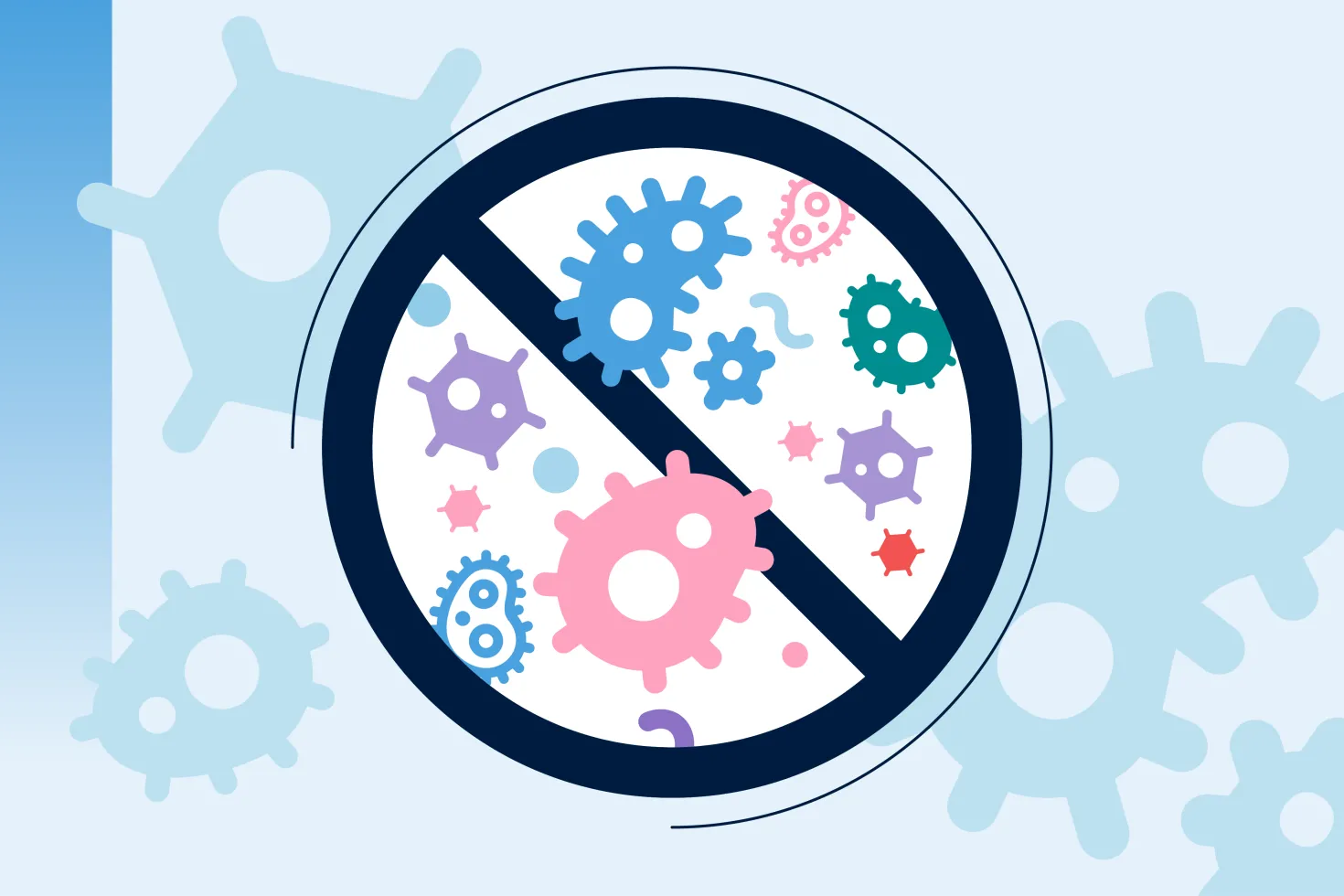
Antimicrobial resistance (AMR) is a growing global threat to health and wellbeing. The World Health Organization has stated that AMR is one of the top 10 global public health emergencies we are facing.
AMR was associated with 4.95 million deaths in 2019 and a reported 1.27 million people died as a direct result of drug-resistant infections. This number could reach ten million and AMR could cost a cumulative $100 trillion of economic output by 2050 without collective action.
Antimicrobial resistance also causes a strain on health systems.[1] Many studies have demonstrated the financial consequences of AMR, including extremely high healthcare costs due to an increase in hospital admissions, longer hospital stays, more intensive care units and isolation beds, and expensive, intensive therapy.[2]
Healthcare professionals are also forced to use less conventional antibiotics or a combination of different antibiotics to treat these infections, which are usually more expensive and which could also have serious side effects.
Furthermore, according to the FAO, if the issue of AMR is not addressed urgently, tens of millions more people will be forced into extreme poverty, hunger and malnutrition.
UICC Podcasts on antimicrobial resistance
What is antimicrobial resistance?
Antimicrobial resistance happens when microorganisms ( such as bacteria, fungi, viruses and parasites) develop the ability to continue to grow, even when they are exposed to antimicrobial medicines that are meant to kill them or limit their growth (such as antibiotics, antifungals, antivirals, antimalarials and anthelmintics).
As a result, the medicines become ineffective and infections persist in the body, increasing the risk of spread to others. While antimicrobial resistance refers to all microbes that resist treatments designed to destroy them, antibiotic resistance specifically deals with bacteria that are resistant to antibiotics.
Did you know?
According to a recent survey by the European Association of Hospital Pharmacists, 63% of hospital pharmacists listed antimicrobial medicines most frequently in shortages, while medicines for cancer were second on the list.
Out of 25 new antibiotics developed between 1999 and 2014, only 12 were registered in more than 10 countries.
Currently, at least 1.27 million people die every year due to drug-resistant infections.
Source: reactgroup.org
Usually, the more often antibiotics are used, the more bacteria adapt and find new ways to survive, which means they become resistant to antibiotics. Instead of being killed by the antibiotics, some bacteria survive and continue to multiply, causing more harm.
Antibiotics are used in the treatment of many diseases and surgical procedure. Examples include organ transplants, blood infections, complicated deliveries, pneumonia and in cancer care. (see ReAct Group) Therefore, patients with infections caused by these drug-resistant bacteria are at an increased risk of poorer clinical outcomes, including death.
Overuse and misuse of antimicrobial medicines are major factors that have contributed to the development of drug-resistant microbes. In many places, antibiotics are overused and misused in people and animals, and often given without professional oversight. Examples of misuse include when they are taken by people with viral infections like colds and flu, and when they are given as growth promoters in animals or used to prevent diseases in healthy animals.[3]
Another major reason for the development of drug resistance is the lack of access to timely and appropriate treatments for infections, especially in LMIC.
Other important contributing factors to AMR include inadequate infection control, substandard/falsified medicines and a lack of access to affordable and appropriate diagnostics that give accurate and real-time results.
How does antibiotic resistance develop
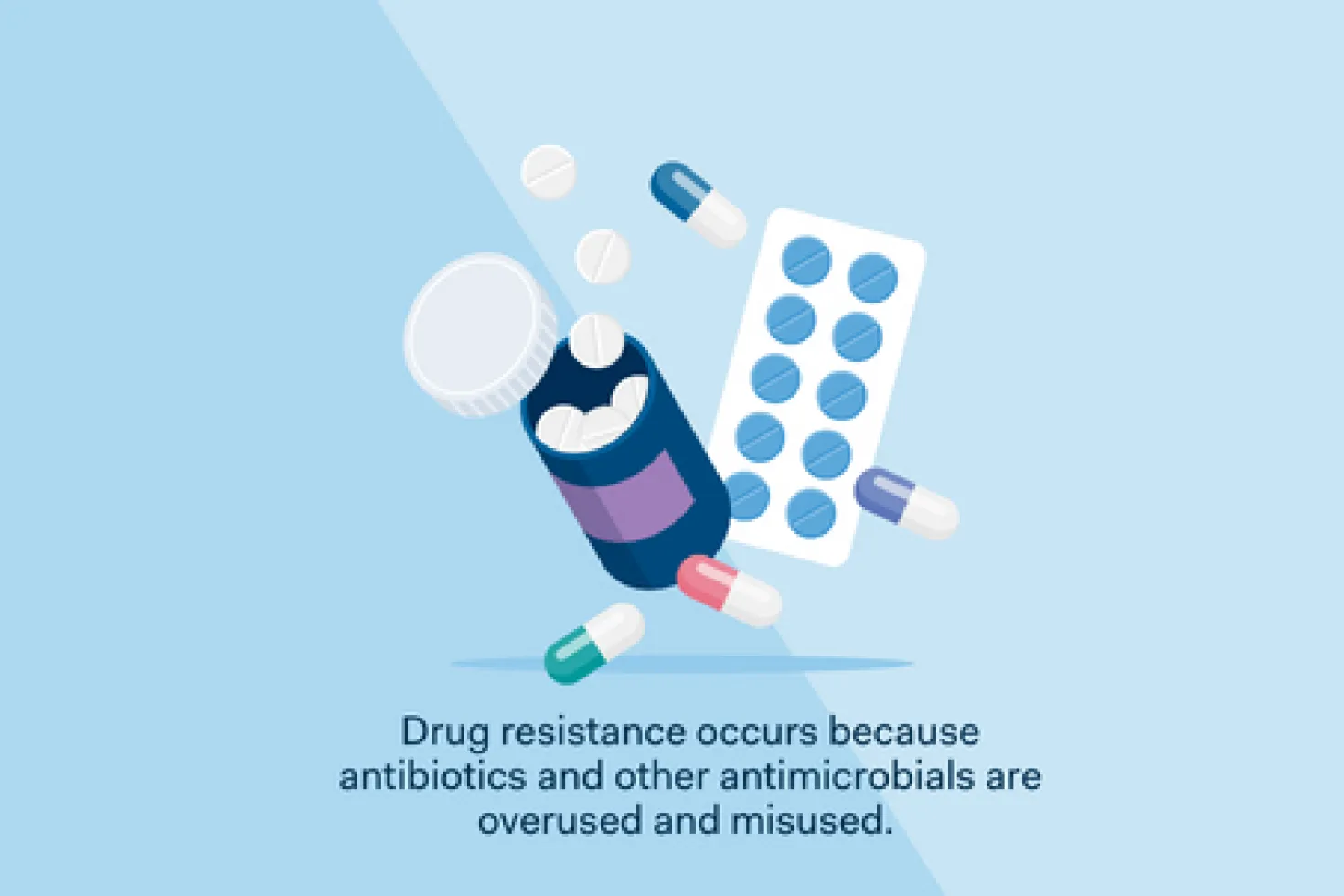
Drug resistance occurs because antibiotics and other antimicrobials are overused and misused.
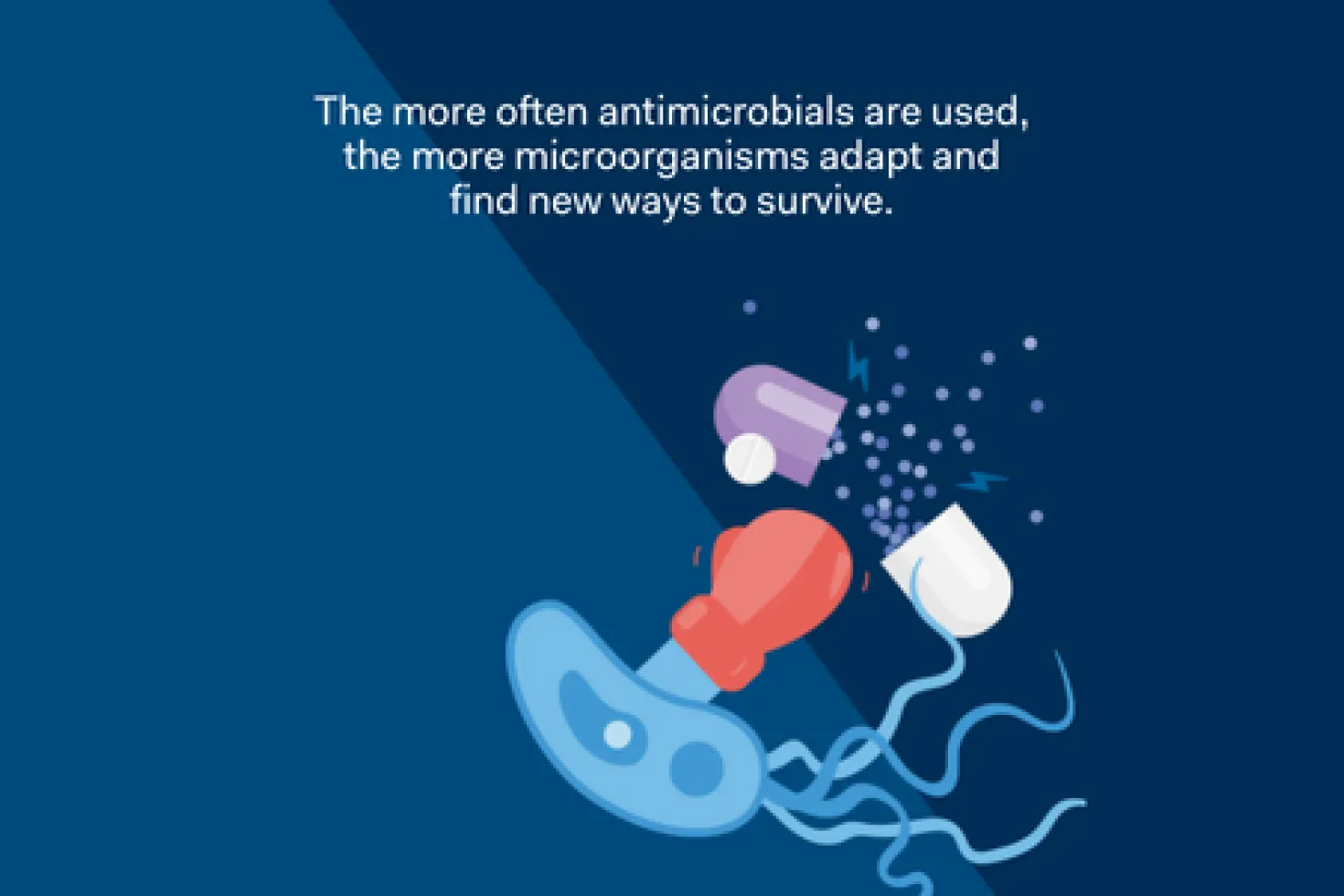
The more often antimicrobials are used, the more microorganisms adapt and find new ways to survive.
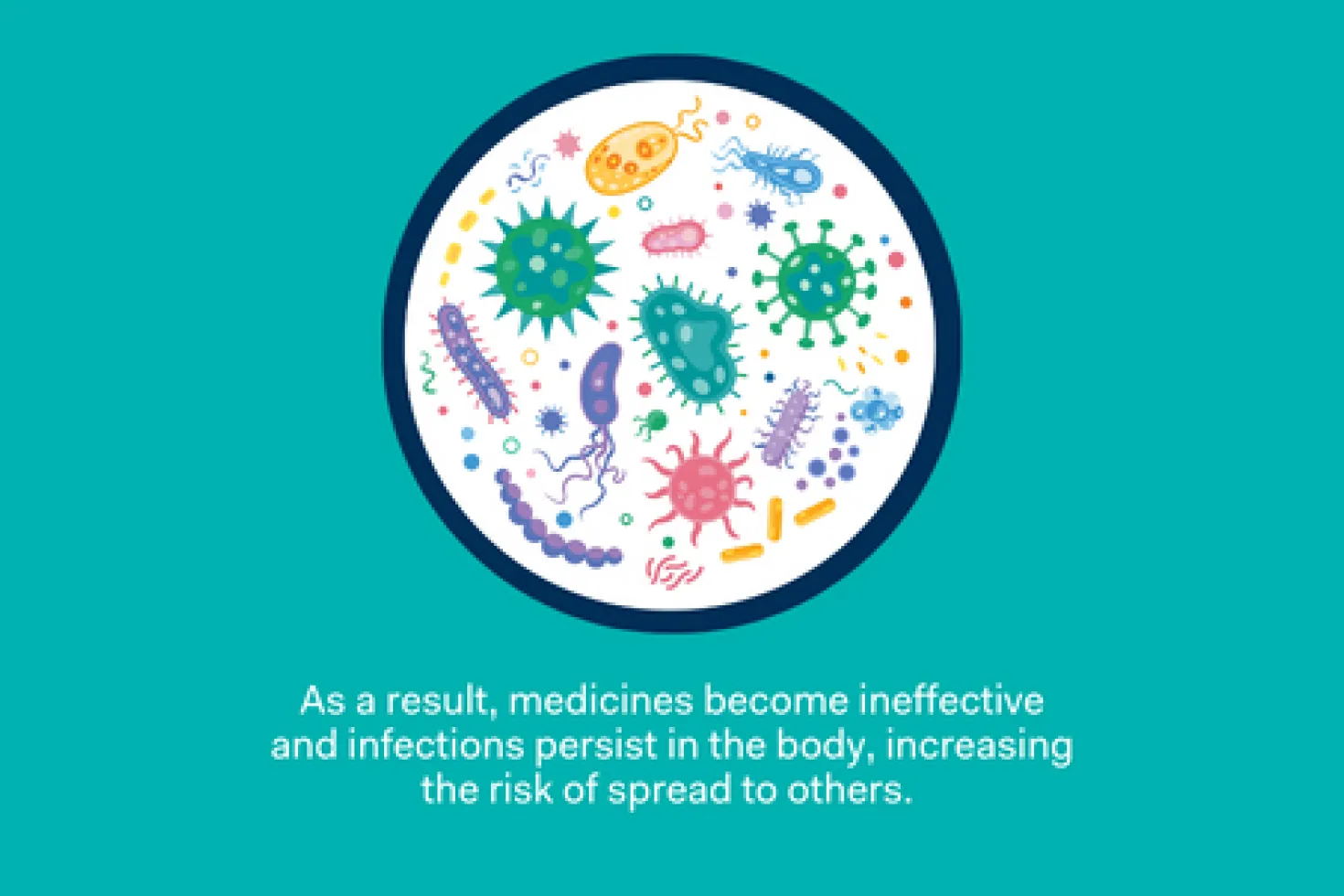
As a result, medicines become ineffective and infections persist in the body, increasing the risk of spread to others.
How does antimicrobial resistance impact cancer care outcomes?
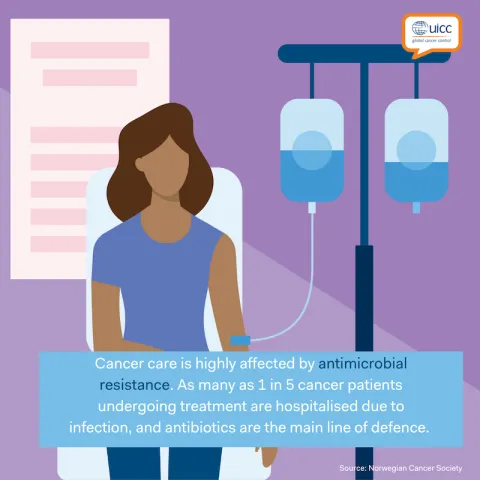
AMR undermines key advances being made in cancer care by adversely affecting cancer treatment outcomes and threatening the survival of people living with cancer.
There has been substantial progress in cancer care in the past decades, with key advances in surgery, radiotherapy and medicines, including the newer immunotherapies. The significant and growing threat of drug-resistant bacteria, however, is undermining all the above-mentioned efforts in cancer treatment.
People with cancer are more susceptible to infections due to the lowering of immune defences, while surgery and treatments like bone marrow transplants, radiotherapy and chemotherapy put the immune system under immense pressure.
It is estimated that approximately 1 in 5 cancer patients will need antibiotics during their cancer treatment.[4] Pneumonia and sepsis (as a result of bacterial infection of the blood) are among the most frequent causes of admission to intensive care units for cancer patients. In fact, it is estimated that 8.5% of cancer deaths are due to severe sepsis.[5]
Antibiotics are a key and indispensable part of cancer treatment – many patients simply have to take them – and for their benefit it is important to better manage the use of these medicines and address this crisis.
Ways to slow down antimicrobial resistance
AMR is a serious global public health issue that needs to be addressed immediately and everyone has a role to play.
For steps that individuals, policymakers, healthcare works and the industry can take, please see below some actions that WHO recommends:
UICC’s work on antimicrobial resistance
Policy change on AMR
UICC supports the cancer community in addressing AMR and aligns its efforts with the WHO global action plan on on antimicrobial resistance adopted by the World Health Assembly in 2015.
In September 2016, at the first UN High-Level Meeting (HLM) on AMR, a political declaration on AMR was adopted - where Member States called for action, and outlined initiatives to address AMR. The second HLM on AMR is scheduled for September 2024 and is an important opportunity for the cancer community to work side by side with other health communities in getting governments and other stakeholders to reaffirm commitments made in 2016.
Self-Guided Courses
UICC provides self-guided courses on addressing the threat of AMR for better cancer care outcomes, accredited by the Accreditation Council of Oncology in Europe (ACOE).
Task Force on AMR
UICC leads a task force focused on AMR and its impact on cancer care outcomes. This task force includes experts from the infectious diseases and cancer communities.
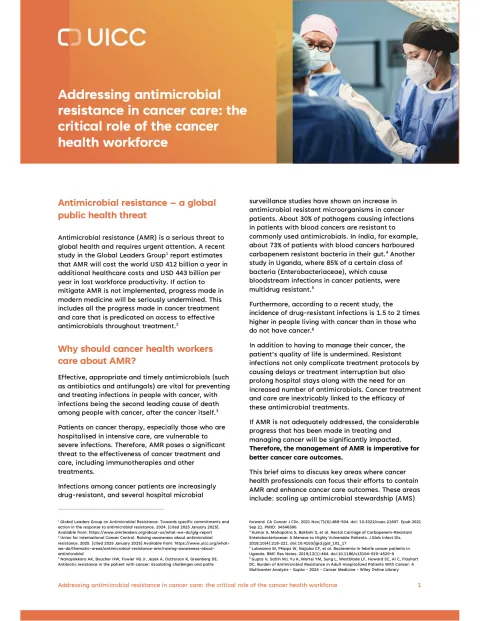
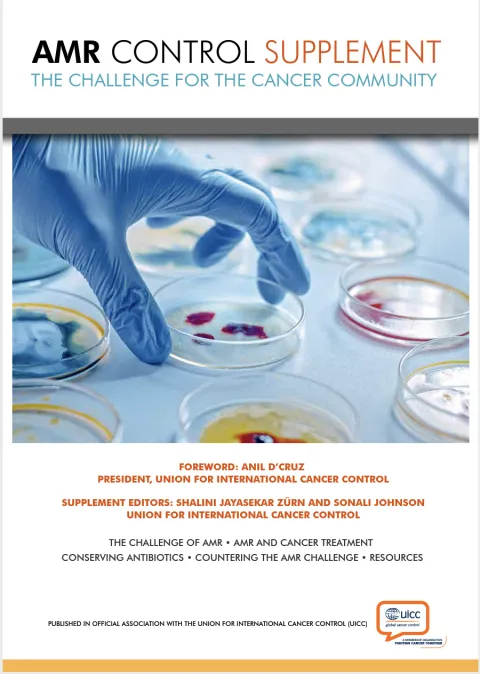
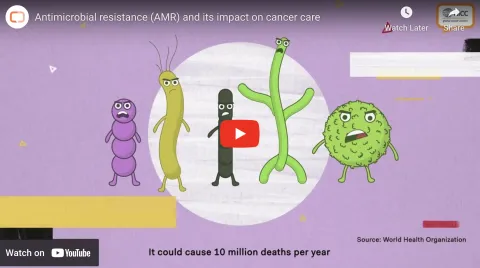
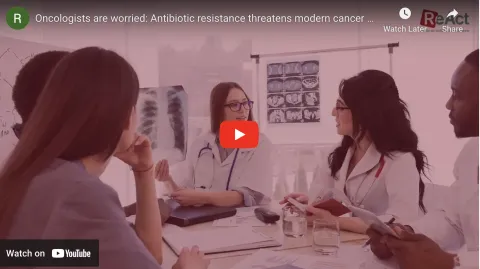
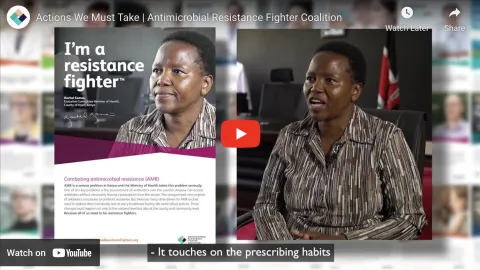
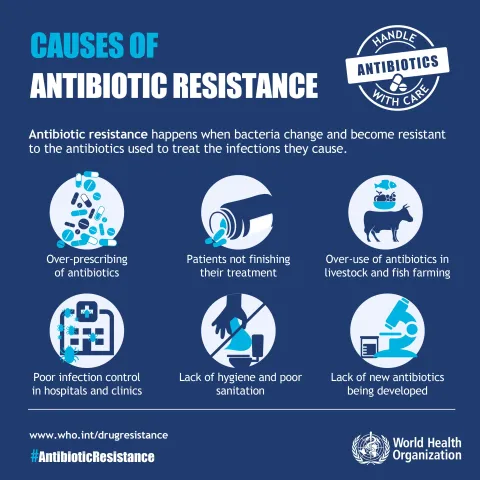
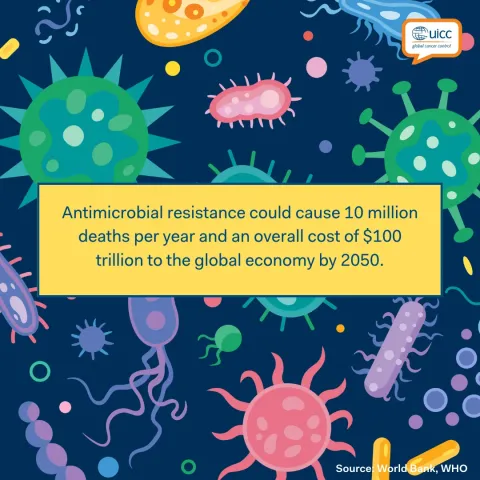
1. What is antimicrobial resistance (AMR)?
Antimicrobial resistance (AMR) refers to the ability of microorganisms (such as bacteria, viruses, fungi, and parasites) to withstand the effects of antimicrobial drugs. When these microorganisms become resistant, the drugs that were once effective in treating infections become less or completely ineffective.
2. Why is AMR a global health concern?
AMR poses a significant threat to public health worldwide. Here’s why:
- Increased mortality: Resistant infections lead to higher mortality rates, as standard treatments fail to work.
- Healthcare costs: Treating AMR-related infections is more expensive due to prolonged hospital stays, additional tests, and the need for newer, costlier drugs.
- Reduced treatment options: As resistance spreads, we lose effective treatment options, making it harder to combat infections.
- Impact on healthcare systems: Overburdened healthcare systems struggle to manage AMR-related cases.
3. How does AMR develop?
AMR develops through several mechanisms:
- Overuse and misuse: Inappropriate use of antibiotics (e.g., unnecessary prescriptions, incomplete courses) accelerates resistance.
- Agricultural practices: Antibiotics used in agriculture can lead to resistance in animals and humans.
- Global travel and trade: Resistant strains can spread globally due to travel and trade.
- Lack of new drugs: Few new antimicrobial drugs are being developed, exacerbating the problem.
4. What can individuals do to prevent AMR?
- Use antibiotics wisely: Take antibiotics only when prescribed by a healthcare professional and complete the full course.
- Practice good hygiene: Wash hands frequently, especially before handling food.
- Vaccination: Prevent infections through vaccination.
- Avoid self-medication: Do not self-prescribe antibiotics.
5. How can healthcare systems address AMR?
- Surveillance: Monitor resistance patterns to guide treatment decisions.
- Infection prevention and control: Implement strict hygiene measures in healthcare settings.
- Education: Raise awareness among healthcare professionals, patients, and the public.
- Research and development: Invest in new antimicrobial drugs.
6. How does UICC contribute to addressing AMR?
UICC actively supports the cancer community in combating AMR through:
- Policy change: UICC aligns its efforts with the World Health Organization (WHO) global action plan on antimicrobial resistance, adopted by the World Health Assembly in 2015.
- UN High-Level Meetings (HLM) on AMR: UICC engages in the second HLM on AMR (scheduled for September 2024) to collaborate with other health communities and urge governments and stakeholders to reaffirm commitments made in 2016.
- Self-guided courses: UICC provides self-guided courses accredited by the Accreditation Council of Oncology in Europe (ACOE) to address the threat of AMR for better cancer care outcomes.
- Task Force on AMR: UICC leads a task force that includes experts from the infectious diseases and cancer communities, specifically focused on AMR and its impact on cancer care outcomes.
Remember, addressing AMR requires collective efforts from individuals, healthcare systems, and policymakers.
Latest UICC news and blog articles on AMR
Why is addressing the bacterial AMR threat so crucial to cancer care patient outcomes?
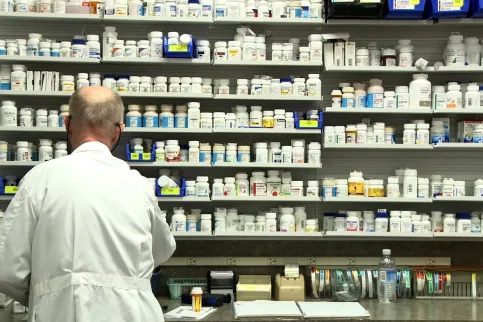
New UICC policy brief outlines urgent steps to address AMR in cancer care

People with cancer face up to three times the risk of drug-resistant infections, new research warns
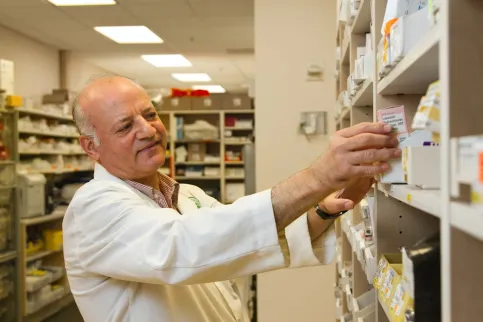
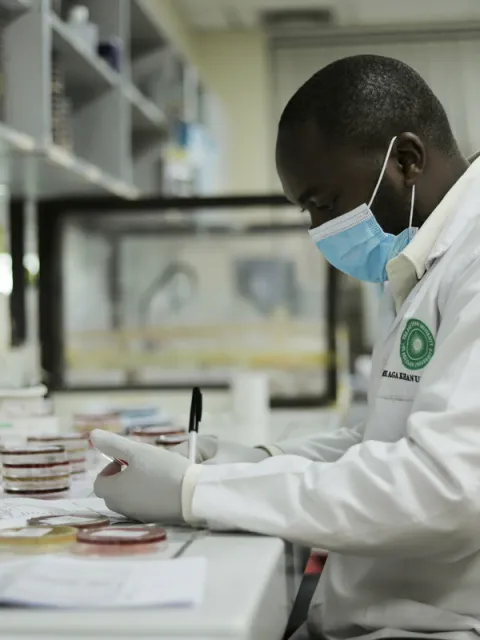
The threat of antimicrobial resistance (AMR) and its impact on cancer treatment is a priority for UICC.
UICC's actions on antimicrobial resistance
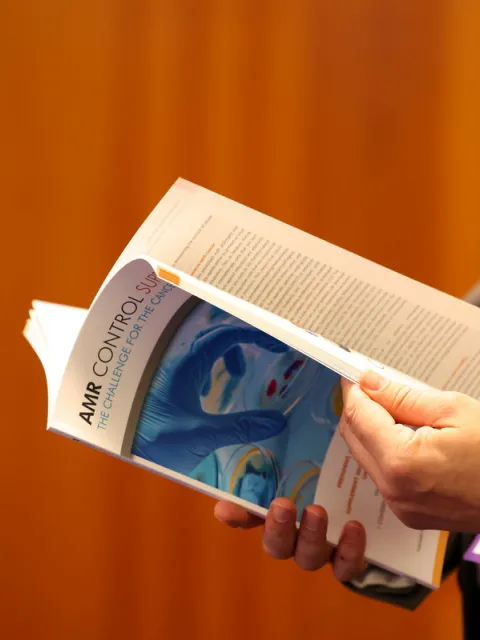
This page regroups important resources on antimicrobial resistance, material for UICC's members and partners, infographics, videos and other important documents and links.
Antimicrobial resistance resources
References
[1] https://www.who.int/news-room/fact-sheets/detail/antimicrobial-resistance
[2] Porooshat Dagostar (2019) “Antimicrobial resistance: Implications and Costs” Infection and Drug resistance, 12: 3903–3910.
[3] https://www.who.int/news-room/fact-sheets/detail/antimicrobial-resistance
[4] https://kreftforeningen.no/en/antimicrobial-resistance-amr/what-are-the-consequences-of-antibiotic-resistance-for-cancer-patients/
[5] ReAct Policy Brief: Successful cancer treatment relies on effective antibiotics
Last update
Wednesday 11 February 2026